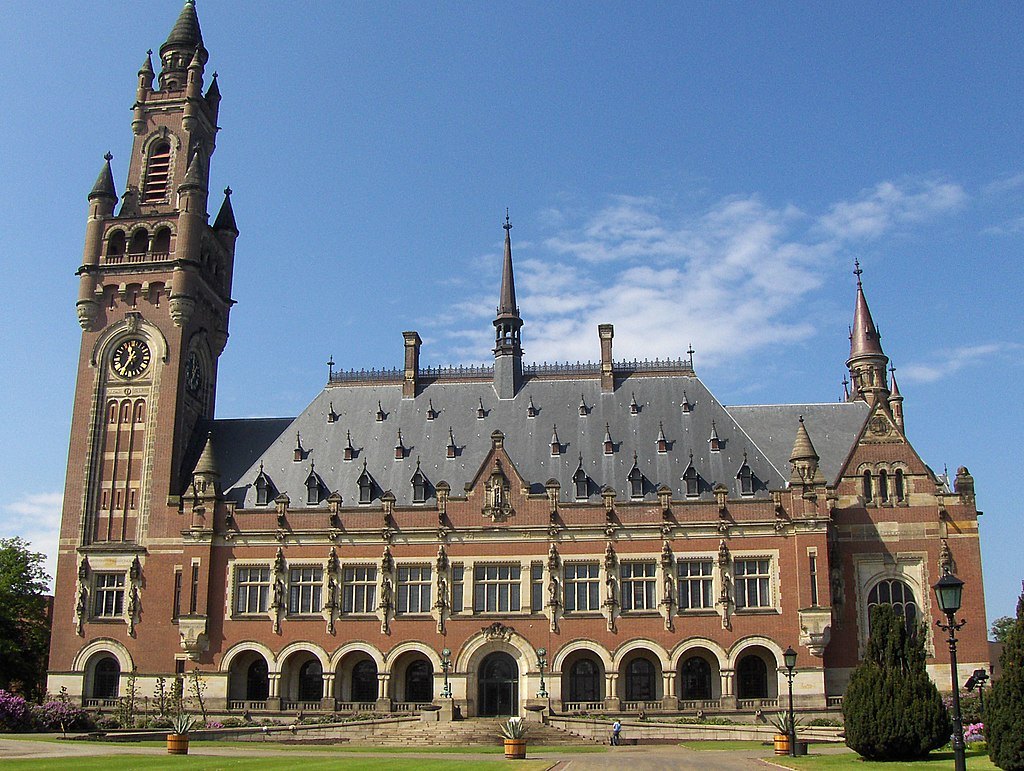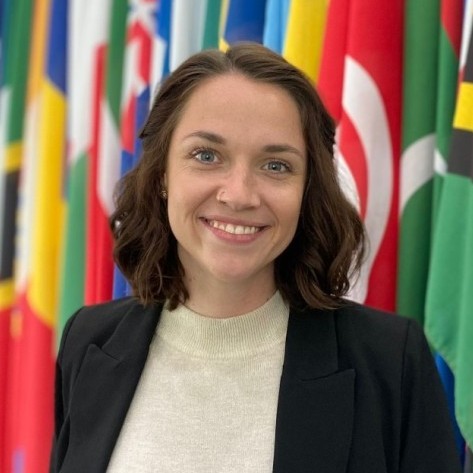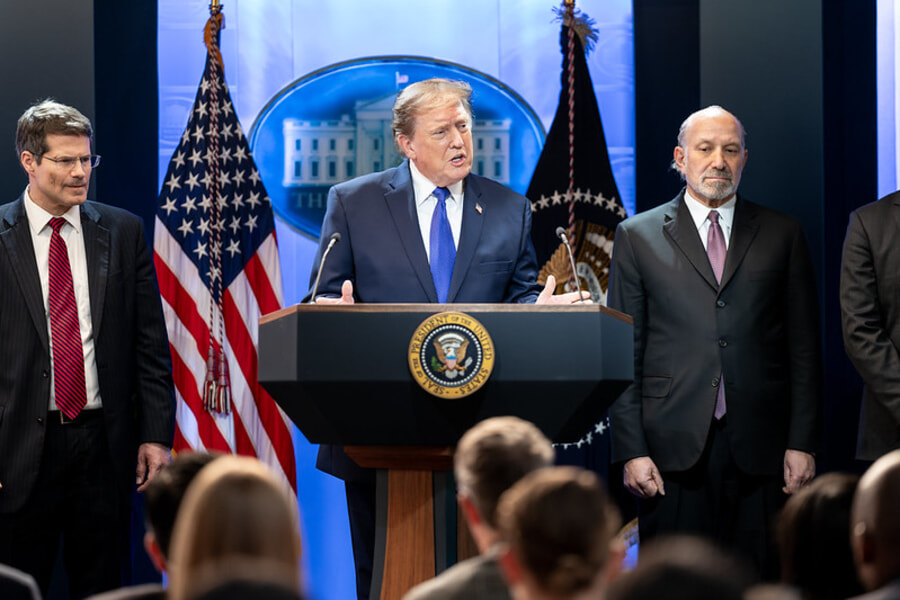The International Court of Justice: A Year in Review

Honorable Judge Joan E. Donoghue, the president of the International Court of Justice, presented the court’s annual report on Oct. 26 to the United Nations General Assembly. The court is the chief judicial body of the United Nations. It was established in June 1945 by the UN Charter with two principal roles: to settle “contentious cases,” which are state-submitted legal disputes, on the basis of international law; and to issue advisory opinions on legal questions referred to the court by the United Nations.
Since the court began operating in April 1946, over 190 cases have been brought before it. The most recent annual report covered the 2022-2023 judicial year, starting on Aug. 1, 2022. In the words of President Donoghue, the cases “reflect a wide variety of legal disputes involving States from all regions of the world that present questions of international law that concern all of humanity.” The president noted a significant increase in the court’s caseload, as it is experiencing “one of the most dynamic periods of its history—a trend that shows no sign of slowing.” The rise in cases may indicate both an increase in disputes and a correlating confidence placed in the court as a dispute-resolution mechanism.
This piece summarizes the court’s report and sheds light on additional court updates that President Donoghue referenced in her presentation of the court’s report to the UN General Assembly.
What’s on the Docket?
The annual report briefly addressed all 20 cases currently on the court’s docket, which includes seven cases brought before the court this year. Five of the new cases are contentious cases submitted to the court by disputing states, and the remaining two are requests for advisory opinions.
The subject matter of the contentious cases ranges widely. They include issues of corruption, sovereignty disputes, and alleged violations of the Convention against Torture. The court’s rulings in contentious cases are legally binding on the states party to the proceedings.
The first filing of the year concerned a sovereignty dispute instituted by Belize against Honduras over the Sapodilla Cayes, islands in the Gulf of Honduras at the southern tip of the Belize Barrier Reef. The Cayes were colonized by the British and operated as the colony of British Honduras until 1981. When Belize and Honduras secured independence from the United Kingdom, both states claimed sovereignty over the Cayes. The disputed sovereignty claims have continued since the early 1980s, and Belize initiated the claim asking the court to render a final resolution to the territorial claims.
In another filing, Equatorial Guinea instituted proceedings against France over alleged violations of the Convention against Corruption. This is the second application Equatorial Guinea has filed against France stemming from the 2010 actions of then-Second Vice President of Equatorial Guinea Teodoro Nguema Obiang Mangue, who currently serves as the country’s first vice president. France confiscated the property that houses the Equatorial Guinean Embassy in France after a decision by French domestic courts that it was acquired by the misappropriation of public funds. Equatorial Guinea asserts that the Convention against Corruption requires France to return assets related to the property confiscation.
Canada has become a recurring presence on the docket, appearing in three of the five newly filed cases. It filed a joint application with the Netherlands against Syria concerning alleged violations of the Convention against Torture. Canada and the Netherlands contend in their application that “Syria has committed countless violations of international law, beginning at least in 2011, with its violent repression of civilian demonstrations, and continuing as the situation in Syria devolved into a protracted armed conflict.” The first public hearings in this case took place on Oct. 10, although Syria did not make an appearance.
Canada also submitted a joint application alongside Sweden, Ukraine, and the United Kingdom against Iran over alleged violations of the Montreal Convention regarding civil aviation. The allegations in this case concern events surrounding the downing of Ukraine International Airlines Flight 752 on Jan. 8, 2020, which killed all 176 passengers and crew members aboard. The applicants assert that Iran failed to “take all practicable measures to prevent the unlawful and intentional” shooting down of a civilian aircraft, in violation of Article 1 of the Montreal Convention. They further allege that Iran failed to conduct impartial, transparent, and fair criminal investigations and prosecutions related to the event consistent with international law.
And Canada appears as a respondent in a newly filed proceeding instituted by Iran, in which Canada is alleged to have violated international law concerning state immunities. Canada’s 2012 amendment to its State Immunity Act allows claims to be brought against foreign states in its domestic courts for alleged support of terrorism. Iran asserts that the allowance of these cases and the corresponding constraints placed on Iranian property violate Iran’s jurisdictional immunity under customary international law.
The docket also includes two requests for advisory opinions, which are generally non-binding interpretations of contested international law questions. The advisory opinions “carry great legal weight and moral authority,” according to the court, and can “contribute to the clarification and development of international law.”
The first advisory opinion request this year asked the court to determine the legal consequences of “Israeli practices affecting the human rights of the Palestinian people in the Occupied Palestinian Territory, including East Jerusalem.” Written submissions were filed by 53 UN member states, the observer State of Palestine, and three intergovernmental organizations. Oral hearings are scheduled to take place in February 2024.
The second request asked the court to interpret the “Obligations of States in respect of Climate Change” under international law. Written submissions by relevant parties are due in January 2024; oral hearings will then be scheduled.
Decisions Rendered
In addition to the newly filed cases described above, the president also provided updates regarding hearings held in nine cases and judgments rendered in four cases.
After almost seven years in litigation, the court ruled in a dispute about Iranian assets and American obligations under the Treaty of Amity (Islamic Republic of Iran v. United States of America). The treaty regulates economic and consular relations between Iran and the United States. Iran asserts the U.S. breached the treaty by allowing domestic claims to be filed against Iran and for the corresponding seizure of Iranian assets. The court upheld an objection to jurisdiction raised by the United States, limiting the scope of the claims adjudicated. However, the U.S. was found in violation of obligations under the 1995 treaty, and the U.S. must compensate Iran for the injurious consequences.
The court rejected an objection raised by Venezuela in a dispute about a land boundary disagreement with Guyana (Guyana v. Venezuela). The claim regards the legality of the Arbitral Award of 3 October 1899—which attempted to resolve a territorial dispute over the Essequibo region. The parties disagreed over the validity of the arbitral award, which found that the Essequibo region lay on then-British Guyana’s side of the border with Venezuela. The court rejected Venezuela’s claim that the court does not have jurisdiction in the matter and will thus proceed to the merits.
The court also rendered its judgment in a case over the use of the Silala River (Chile v. Bolivia). The case originated in 2016 when Bolivia requested compensation for Chile’s use of the river, and Chile claimed it was entitled to use the river without compensating Bolivia under customary international law. During the proceedings, it became apparent that “the Parties agree that under customary international law they are both equally entitled to the equitable and reasonable use of the Silala’s waters.” Thus, the court found there was no longer a “dispute” to resolve. In a separate opinion, Judge Bruno Simma noted the judgment “decides almost nothing” and sets the bar too low for determining whether a dispute has been resolved during proceedings.
Lastly, the court ruled on several questions of maritime boundaries and territorial limits regarding the Nicaraguan and Colombian coasts (Nicaragua v. Colombia). The court issued a ruling in 2012 that affirmed Nicaragua’s sovereignty over the continental shelf within 200 nautical miles from its coastline, while also awarding seven small islands to Colombia. In this dispute, Nicaragua argued that its territory should extend beyond the 200 nautical miles awarded, instead arguing for control over the entire continental shelf that extends from its coastline. Colombia countered that the territory would overlap with the islands under Colombia’s control. In the recent judgment, the court confirmed that “Nicaragua is not entitled to an extended continental shelf within 200 nautical miles from the baselines of Colombia’s mainland coast.”
Procedural Changes: Gender-Neutral Language
The court promulgated amendments to make the Rules of Court, the Practice Directions, and the Resolution Concerning the Internal Judicial Practice of the Court more gender inclusive. Previously these three documents referred to the judges using male pronouns. For example, Article 4(3) of the Rules of Court previously read, “A Member of the Court who is re-elected shall make a new declaration only if his new term is not continuous with his previous one” (emphasis added). The amended rules state, “A Member of the Court who is re-elected shall make a new declaration only if the new term is not continuous with the previous one,” thus not assuming any gender of the relevant parties. President Donoghue noted that a key motivating factor for the amendments was the “[c]ourt’s recognition of the importance of language in shaping viewpoints and beliefs on gender equality and inclusion.”
Asbestos and Budget Requests
The court meets in the Peace Palace, “an iconic building which has come to symbolize peace in action” based in The Hague. Built over a century ago, the building was found to be contaminated with asbestos in 2016. Investigations and consultations between the court and the Netherlands are ongoing to determine how to address this problem and survey for asbestos moving forward.
Before closing her presentation, the president discussed the court’s current budgetary situation. In light of the relatively significant volume of judicial activities described above and the “significant increase in the Court’s docket in recent years,” “appropriate adjustments of the Court’s budgetary resources” are requested to ensure the court can continue to fulfill its mandate. Article 33 of the court’s statute requires the United Nations to bear the expenses of the court in a manner “decided by the General Assembly.” In practice, the court decides its budgetary needs in consultation with the secretary-general. After approval, the court’s draft budget is incorporated into the total UN budget and considered by the Fifth Committee before being adopted by the General Assembly.
What to Expect Moving Forward
As the world inevitably continues to face international conflicts, the International Court of Justice remains a vital mechanism in peaceful dispute resolution. As the current docket displays, the questions before the court address pivotal issues of international law that have meaningful consequences for global peace and security. In coming years, those following the court can expect further judgments in important international contexts—such as the conflict between Armenia and Azerbaijan, the Rohingya genocide, and the war in Ukraine.



-2.jpg?sfvrsn=f979c73d_6)
